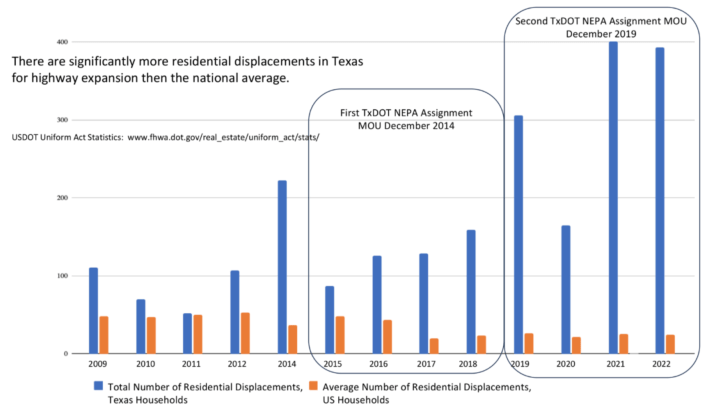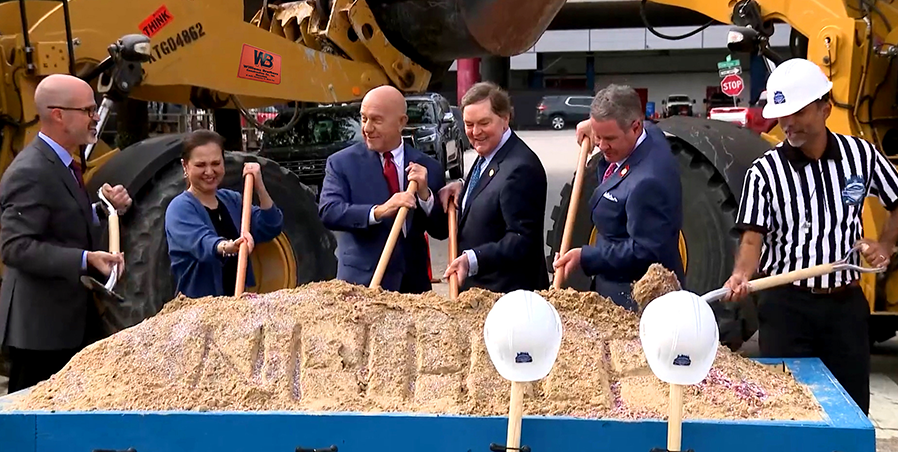In late October, protestors in Houston watched as officials wheeled a trough out into the middle of St. Emanuel Street and each scooped out a ceremonial shovelful of sand.
The officials were ostensibly there for a symbolic groundbreaking for the North Houston Highway Improvement Project, which will widen or rebuild around 25 miles of Interstate 45 in the heart of Texas's largest city. For the protesters, though, the bulldozers that loomed in the background of that photo-op were a very real threat of the harm soon to come to St. Emanuel Street, and the estimated 1,079 homes, 344 businesses, five places of worship and two schools that will be razed to make way for the road.
"Half of that street is going to be gone," added Erin Eriksen, an organizer with Stop TxDOT I-45. "Half of those businesses are going to be torn down. And TxDOT was basically thumbing its nose at these places that were going to be destroyed because of this project."
According to official analyses, though, the destruction of St. Emanuel Street and so many like it isn't enough of an "environmental impact" to justify canceling the I-45 project, even though it will dramatically exacerbate pollution, flooding, and inequality in the disproportionately low income communities of color through which the expansion will largely run.
And that's probably because the Texas Department of Transportation wrote those official analyses itself.
'A fox guarding a hen house"
Thanks to a little-known loophole in federal law known as the "NEPA assignment" program, DOTs from Texas and six other states — Alaska, Arizona, California, Florida, Ohio, and Utah — are temporarily "assigned" the responsibility of conducting what are normally federally overseen environmental assessments. The states must reapply every five years when their authority expires; Texas's authority expires this year, and members of the Texas Streets Coalition are urging advocates to comment on whether it should be rescinded before Dec. 9.
In theory, NEPA assignment is supposed to help responsible state DOTs build projects quickly, without having to wait on a single understaffed federal agency to work through a backlog of proposals from across the country before giving the green light on a simple repaving or repair. Some argue that it also gives environmentally progressive states an opportunity to conduct an even more thorough analysis than the feds would do on their own.
In car-dominated Texas, though, Heyden Black Walker of Reconnect Austin argues that NEPA assignment is essentially a "fox-guarding-the-henhouse situation" — and its consequences shouldn't be surprising to anyone.
In Walker's native Austin, for instance, advocates say that Texas DOT misleadingly "segmented" the expansion of a single interstate known as I-35 into three smaller projects along the exact same road, hiding the staggering impacts the expansion would have for the region on the whole — and, advocates say, violating federal law. Walker says the 9,000 pages of official documents about the project also didn't adequately consider the highway's impacts on air pollution, and failed to study whether railway investments could address the same problems the expansion was meant to solve.
That the I-35 expansion received even that degree of scrutiny, though, is something of an outlier.
Texas activists found that between 2015 and 2022, only six TxDOT projects receive a full-blown "environmental impact statement," an exhaustive process that details exactly how the agency will mitigate the harm it will cause. A staggering 130 projects, by comparison, only received a far-simpler "environmental assessment," all of which resulted in a "finding of no significant impact," or FONSI, which is pronounced like the shark-jumping character on "Happy Days."
Cumulatively, though, those "insignificant" projects displaced a total of 477 homes and 376 businesses, and consumed $24 billion taxpayer dollars. And advocates say that lack of oversight is particularly damning for a state that would rank eighth in the world for carbon dioxide emissions if it were a country, and that polluted nearly twice as much as second-ranked California in 2019.
"The things that NEPA was intended to protect us from — from inordinate displacement, from worse air quality — Texas is failing on all of those metrics," said Peter Eccles, director of policy and planning at LINK Houston, a transportation advocacy group. "Since TxDOT entered NEPA assignment in 2014, displacements have skyrocketed across Texas, dwarfing the national average in terms of how many households are displaced for freeway projects, as well as the number of counties that are no longer in attainment for criteria pollutants. ... It's not working as intended."

If the federal government were conducting the NEPA process, advocates argue that Texas might face stricter standards for what constitutes a "significant" impact, rather than letting the state write off families losing their homes and nearby residents getting cancer and heart disease as unfortunate but necessary evils. And maybe, bad projects might even be stopped before they start.
"TxDOT is setting up its own environmental reviews, setting its own parameters, and then self-grading its own performance by the parameters that it sets," said Bobby Levinski, an attorney with the Save Our Springs Alliance. "And we don't have that federal oversight that used to exist where, if you did have a disagreement over what the current state of the science is, [you might have] a technical expert at the federal level who could say, 'No, you didn't quite do a good enough job looking at, say, this air quality aspect.'
"That check no longer exists," he continued. "And at the end of the day, they're going to give themselves an 'A.'"
NEPA Assignment Under Trump
Levinski acknowledges that some might be wary of handing environmental power back to the federal government — especially with Trump returning to the White House.
Project 2025, which many believe will serve as the incoming president's playbook, promises to restore regulations limiting environmental review that Trump put in place the last time he was in office, as well as "frame the new regulations to limit the scope for judicial review of agency NEPA analysis and judicial remedies."
Advocates in Texas, though, say they're already living in a world where NEPA has been badly watered down — and because of their state's special authority, Washington is largely powerless to intervene. Restoring federal oversight, they argue, is a critical first step to making things right, followed by voting in a presidential administration that takes NEPA seriously.
“We’ve been working for years within a state government that is very much aligned with Trump politics," said Katy Atkiss, facilitator for the Texas Streets Coalition. "None of the five men appointed by Governor Abbott to the Texas Transportation Commission have transportation expertise — though many do have business interests related to freeway expansions.”
Until Texas's NEPA assignment is revoked, all advocates can do is sue to stop bad projects — though with POTUS picking many of the judges, that's an increasingly bleak prospect, too.
"With Trump being in office, the courts aren't getting easier, either," added Levinski. "[And] making the public be the enforcer of NEPA, I think, puts a big onus on the residents of Texas to go up against the giant Goliath that is TxDOT on every single case. ... We need some measure of oversight. You can't just write off the entire state of Texas."
The members of the Texas Streets coalition acknowledge that getting their state's NEPA assignment revoked won't be easy — and if it can't be done, they hope USDOT will at least make some common-sense changes.
The state might still be allowed do its own environmental assessments, but not on massive highway projects that displace hundreds of residents through rampant use of eminent domain. The feds also might force the DOT to wait at least 30 days to collect public comments after they make changes to their plans, or submit to stronger "an annual NEPA compliance audit" to ensure they're not flouting federal laws. At a minimum, they could acknowledge that granting states like Texas the ability to do their own environmental review even as they're suing to hide their greenhouse gas emissions from the public seems like a pretty obvious flaw in the system.
At the end of the day, though, advocates say we need to address the shortcomings of NEPA itself, which still doesn't factor in the power of induced demand — and still offers all states too many opportunities to build destructive highways, even when the federal government is grading their projects.
"I think that NEPA assignment and its abuses by TxDOT are a symptom of the larger failings of NEPA as a whole," added Eccles. "NEPA was very well intentioned at the time [it was written], but certain states like TxDOT have gotten very good at gaming it to rubber stamp projects that they want to do regardless. Contrast that with the NEPA burden that the Federal Transit Administration puts on transit projects; it's much more rigorous, and it ends up slowing down those projects significantly. We need to have a clearer picture of what projects benefit the environment, and which projects harm it."
Editor's note: a quote from Katy Atkiss was updated at her request.






